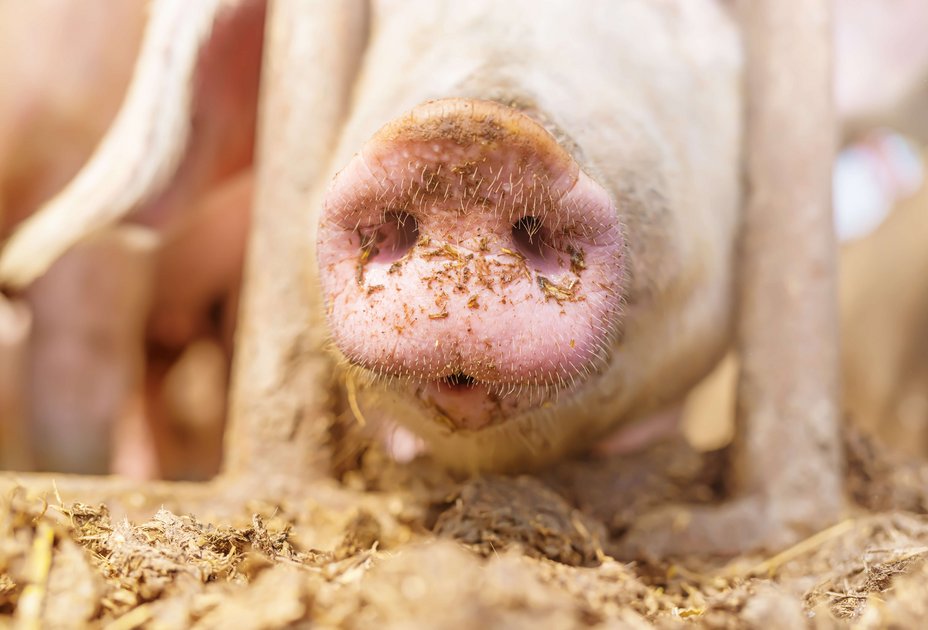- Home /
- University /
- Infoservice /
- Press Releases /
- One Health: Flies Threaten Domestic Pigs with Staphylococcus aureus
Research
One Health: Flies Threaten Domestic Pigs with Staphylococcus aureus

The bacterium Staphylococcus aureus is ubiquitous and generally harmless. However, it can also be pathogenic, and its resistant forms are known as "hospital superbugs." Livestock farming and agriculture are partly responsible for these resistances—a classic One Health scenario, where the health of the environment, animals, and humans is viewed in connection. A recent study by the University of Veterinary Medicine Vienna now shows that flies play an important role in the development of resistances. They act as vectors for domestic pigs.
The bacterium Staphylococcus aureus, particularly its methicillin-resistant form (MRSA), poses a significant challenge to public health due to its resistance to β-lactam antibiotics and its frequent multidrug resistance. MRSA originating from livestock (LA-MRSA), especially the clonal complex 398 (CC398), has become a more or less fixed component of the microbial spectrum in pig farming.
New findings suggest that flies could act as vectors. "We therefore investigated the occurrence and molecular characterization of MRSA in houseflies (Musca domestica) and stable flies (Stomoxys calcitrans) in Austrian pig farms. Our goal was to learn more about their role in the transmission of MRSA and the spread of resistances," explains Lukas Schwarz, the study's senior author from the Clinical Centre for Population Medicine in Fish, Pig and Poultry.
High Proportion of Multidrug Resistance in MRSA from Pig Farms
MRSA was detected in 41.7% of the 24 pig farms studied, with isolates identified in houseflies (53.2%), stable flies (19.1%), boot swab samples (17.0%), and dust wipe samples (10.6%). "All isolates were resistant to cefoxitin and belonged to CC398, carrying various resistance genes," explains Flora Hamar, the study's first author.
The resistance was not limited to β-lactams. The researchers detected resistance to tetracycline (100%), erythromycin (74%), clindamycin (74%), ciprofloxacin (32%), and trimethoprim-sulfamethoxazole (17%). Multidrug resistance (MDR) was found in 94% of the isolates. The cause of the acquisition of multidrug resistance remains speculative but will be investigated further in a follow-up project.
Houseflies More Dangerous than Stable Flies, One Health Measures Needed
Houseflies (26%) were more frequent carriers of MRSA than stable flies (9.4%), highlighting their potential as significant vectors. Environmental samples (boot swab and dust wipe samples) confirmed widespread contamination in barns. "Our study demonstrates the high prevalence of LA-MRSA in Austrian pig production facilities and identifies flies as vectors contributing to its spread," emphasizes Lukas Schwarz. "These findings underscore the importance of robust biosecurity measures, including effective fly control and strict hygiene protocols, to mitigate MRSA risks in agricultural environments."
According to the researchers, public health strategies should focus on the prudent use of antibiotics and a One Health approach to significantly curb the spread of antibiotic resistance among humans, animals, and the environment. Integrated pest control measures, such as managing housefly and stable fly populations in livestock barns, can help reduce the spread of resistances via the fly vector to other farms and/or the environment.
The article „MRSA in pig farming: the emerging role of flies in antimicrobial resistance: a cross-sectional study“ by Flora Hamar, Igor Loncaric, Tanja Bernreiter-Hofer, Adriana Cabal Rosel, Anna Stöger, Monika Palle-Reisch, Werner Ruppitsch, Annemarie Kaesbohrer, Andrea Buzanich-Ladinig, Michael Bluemlinger and Lukas Schwarz was published in „Porcine Health Management“.
Scientific article
Scientific contact:
Dr.med.vet. Lukas Schwarz, Dipl.ECPHM
Klinisches Zentrum für Populationsmedizin bei Fisch, Schwein und Geflügel
Veterinärmedizinische Universität Wien (Vetmeduni)
Lukas.Schwarz@vetmeduni.ac.at